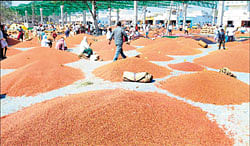Shortage? Price rise? Never!

A Cambridge-educated economist with links to the Left, Sen has given his inputs and the Bill is now ready to be placed before the Union Cabinet.
Sen believes that the new law, like the National Rural Employment Guarantee Scheme (NREGS), will empower the poor. Speaking to Ajith Athrady of Deccan Herald, Sen shared his thoughts on the viability of the Bill.
The Food Security Act, if implemented, may jack up foodgrain prices as government procurement will go up.
This is a sheer misconception of a section of the people. Of the total 235-240 mllion tonne (MT) foodgrain produced in the country, the government procures only 61 MT a year of which 55 MT is sufficient for providing food security. The remaining six MT is enough for free feeding programmes such as mid-day meal. More than 170 MT grain will still be available either with the farmers or the traders. So, where is the shortage of foodgrains in the open market and how will prices go up?
You are a votary of direct cash transfer instead of foodgrain subsidy?
Yes, cash transfer is a good idea, but it can work only in some situations. It cannot be used as a magic wand to deliver various subsidies. Let the state governments take a call.
Two chief ministers - Sheila Dikshit in Delhi and Nitish Kumar in Bihar - favour cash transfer because they admit their PDS is in a very bad shape. I still agree with the opponents of cash transfer and say it should be used as a last resort. But if a State chief minister concedes the public distribution system is faulty, can I dispute it?
What happens in a drought situation when the government cannot mobilise the required foodgrains. Won’t the scheme be stymied?
The government will always ensure a buffer stock. At present our food stocks are more than 180 MT in surplus. There is also a provision in the food bill to give cash if foodgrain production falls due to drought.
Is Green Revolution II necessary?
Primarily, we should understand what Green Revolution was all about. It happened in two research institutions in the Philippines and Mexico, and we got some dwarf varieties of wheat first and then rice, which were supported by fertiliser inputs. Currently, farmers earn by growing alternative crops. Due to Intellectual Property Rights, nothing comes free. Hence, we cannot replicate the Green Revolution. Instead, India should accelerate agriculture growth in per capita terms. We must increase our foodgrain production.
Issues such as lack of storage, movement of grains and vigilance to plug pilferage remain. Comment.
The problem of storage is real. The Centre is working out modalities with the states to promote private godowns across the country.
The Food Corporation of India is also permitted to rent private warehouses to store grain. Vigilance has to be addressed by the states. Foodgrain movement has to be modernised.
Deccan Herald is on WhatsApp Channels| Join now for Breaking News & Editor's Picks